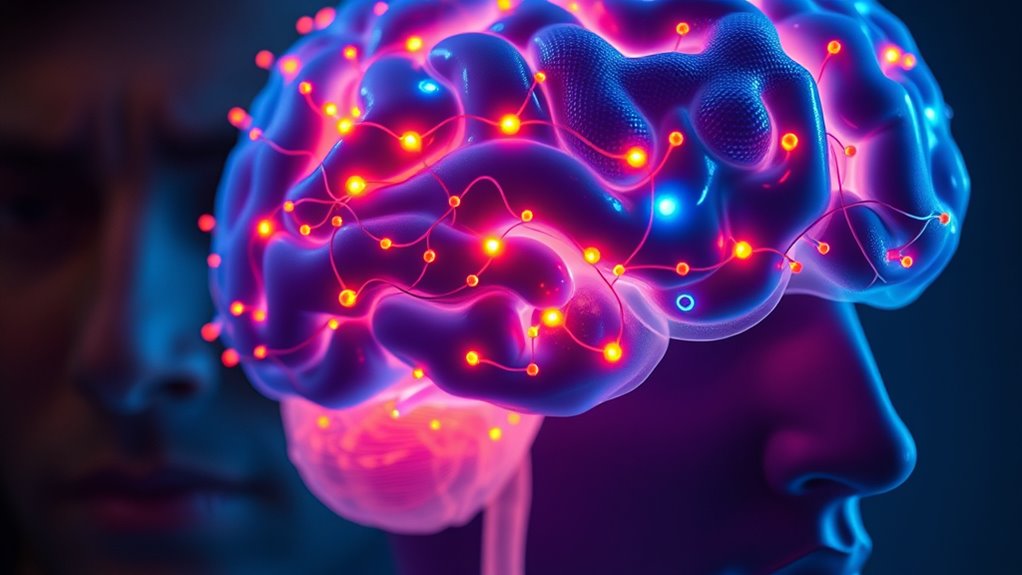Stress triggers emotional and physical responses that can overwhelm your coping skills, leading to anxiety, depression, and other mental health issues. Prolonged stress elevates hormones like cortisol, which affect brain regions responsible for memory, decision-making, and emotional regulation. Recognizing your personal triggers and adopting healthy habits such as exercise, mindfulness, and social support can help manage stress. Understanding these effects and strategies is key—continue exploring to learn how you can protect your mental well-being.
Key Takeaways
- Chronic stress elevates cortisol levels, damaging brain regions and impairing emotional regulation, memory, and decision-making capabilities.
- Prolonged stress increases vulnerability to mental health disorders like anxiety and depression.
- Recognizing stress symptoms such as irritability, sleep disturbances, and physical pain is crucial for early intervention.
- Coping mechanisms like mindfulness, social support, healthy lifestyle habits, and relaxation techniques help manage stress effectively.
- Seeking professional help is essential when stress causes significant functional impairment or persistent mental health issues.
Understanding the Connection Between Stress and Mental Health

Stress directly impacts your mental health by triggering emotional and physical responses that can overwhelm your ability to cope. When you’re stressed, your body releases hormones like adrenaline and cortisol, which prepare you for a fight-or-flight response. While useful in short bursts, prolonged stress keeps these hormones elevated, affecting your brain’s chemistry. This can lead to feelings of anxiety, irritability, and difficulty concentrating. Over time, chronic stress may impair your mood regulation and make you more vulnerable to mental health issues such as depression or anxiety disorders. Recognizing how stress influences your mental state helps you understand the importance of managing it effectively. Understanding the role of hormonal responses in stress can help you develop better coping strategies. By understanding this connection, you can better develop strategies to protect your emotional well-being and maintain mental resilience.
Common Signs of Stress That Affect Mental Well-Being

Recognizing the signs of stress is essential because they can subtly or noticeably impact your mental well-being. You might notice increased irritability, feeling overwhelmed, or difficulty concentrating. Physical signs like headaches, muscle tension, or changes in sleep patterns also serve as red flags. You may find yourself withdrawing from social activities or losing interest in things you usually enjoy. Anxiety might surface as racing thoughts or a constant sense of worry. Emotional shifts, such as feeling more anxious, frustrated, or hopeless, are common indicators. These signs often appear gradually, making it easy to overlook them. Being aware of these symptoms helps you address stress early, preventing it from worsening and affecting your mental health further. Incorporating mindful decluttering practices can also alleviate some sources of stress by creating a more organized and peaceful environment. Additionally, understanding stress management techniques can empower you to develop healthier coping strategies. Recognizing these signs is the first step toward effective coping, especially considering that development influenced by biological, cognitive, and social factors plays a role in how individuals experience stress and adapt to challenges.
How Chronic Stress Contributes to Anxiety and Depression

Chronic stress can throw your hormones out of balance, increasing feelings of anxiety and sadness. When you’re emotionally exhausted, even simple tasks may feel overwhelming, fueling depression. Recognizing these signs helps you understand how ongoing stress impacts your mental health. Preppy Dog Names are a great example of how cultural influences can shape our choices, similar to how understanding breed-specific traits can aid in selecting appropriate coping strategies.
Hormonal Imbalance Effects
When your body faces prolonged stress, it triggers a cascade of hormonal changes that can disrupt your mental health. Your adrenal glands release cortisol, the primary stress hormone, which, in small doses, helps you respond effectively. But when stress persists, cortisol levels remain elevated, interfering with neurotransmitters like serotonin and dopamine that regulate mood. This hormonal imbalance can lead to feelings of anxiety, irritability, and sadness. Additionally, chronic stress lowers levels of hormones like GABA, which has calming effects, making it harder to relax. Furthermore, stress can impact Crochet Styles for Locs by creating a sense of mental fatigue or tension. Over time, these disruptions can contribute to the development or worsening of depression and anxiety. Recognizing how hormonal imbalances caused by stress affect your mental health helps you understand the importance of managing stress effectively.
Emotional Exhaustion Signs
Persistent stress gradually drains your energy and resilience, often manifesting as emotional exhaustion. You may feel overwhelmed, detached, or unable to find joy in activities you once loved. Recognizing these signs helps you address the impact of chronic stress on your mental health. Common emotional exhaustion signs include:
- Feeling emotionally drained or numb
- Increased irritability or mood swings
- Difficulty concentrating or making decisions
- Loss of motivation and persistent fatigue
These symptoms often signal that stress has taken a toll, making it harder to cope with daily challenges. If ignored, emotional exhaustion can deepen into anxiety or depression. Paying attention to these signs allows you to seek support, practice self-care, and implement coping strategies before burnout worsens. Additionally, understanding how resources and tools can support mental health strategies offers innovative avenues for managing stress. Developing emotional resilience can help you better navigate difficult situations and reduce the risk of burnout. Incorporating wall organization systems and other aesthetic home decor solutions can create calming environments that promote mental well-being and reduce stress levels. Exploring personal debt forgiveness bills may also alleviate financial stress, contributing to overall mental health improvements.
The Role of Cortisol and Brain Chemistry in Stress Response

When you experience stress, your body releases cortisol, which influences your brain’s chemistry. This hormone affects key regions like the hippocampus and prefrontal cortex, altering memory and decision-making. Understanding these effects helps explain how stress impacts your mental health on a biological level. Additionally, prolonged exposure to cortisol can impair brain function, potentially leading to mood disorders and anxiety. Chronic stress may also disrupt sleep patterns, further exacerbating mental health challenges. Building awareness of emotional impact techniques can help individuals better manage stress responses and maintain mental well-being.
Cortisol’s Neurochemical Effects
Cortisol, often called the body’s primary stress hormone, plays a crucial role in how your brain responds to stress. It influences your neurochemistry in several ways.
- It increases glucose availability, giving your brain immediate energy during stressful moments.
- Cortisol impacts neurotransmitter levels, affecting mood and alertness.
- It modulates synaptic activity, influencing how your neurons communicate.
- Prolonged exposure can disrupt neurotransmitter balance, leading to feelings of anxiety or depression.
Understanding these effects helps explain how stress hormones alter brain chemistry, impacting your mental health. Elevated cortisol levels can impair cognitive functions and emotional regulation, making it harder to cope. Recognizing these neurochemical changes is key to developing effective stress management strategies.
Brain Regions Affected
Cortisol’s influence extends beyond neurochemical changes, directly affecting key brain regions involved in stress regulation. When stress triggers cortisol release, it impacts areas like the amygdala, hippocampus, prefrontal cortex, and hypothalamus. The amygdala heightens your fear response, making you feel more anxious. The hippocampus, vital for memory, can shrink with prolonged stress, impairing learning. Your prefrontal cortex, responsible for decision-making, becomes less effective, reducing your ability to regulate emotions. The hypothalamus controls hormone release, perpetuating stress responses. Understanding these effects helps you recognize how chronic stress damages mental health. Here’s a simplified overview:
| Brain Region | Effect of Cortisol |
|---|---|
| Amygdala | Increased fear and anxiety |
| Hippocampus | Memory impairment and shrinkage |
| Prefrontal Cortex | Reduced decision-making and regulation |
| Hypothalamus | Sustains stress response |
Recognizing Personal Stress Triggers and Patterns

Understanding your personal stress triggers and patterns is essential for managing your mental health effectively. When you identify what causes your stress, you can develop strategies to handle it better. Start by observing situations that consistently cause tension or anxiety. Next, notice how your body reacts—tight muscles, rapid heartbeat, or worry. Then, track your emotional responses—irritability, sadness, or overwhelm. Finally, recognize recurring patterns, such as certain times of day or specific people, that heighten your stress. Being aware of stress responses can help you implement targeted coping mechanisms. Additionally, understanding how automation in business impacts your daily routines might provide insights into external stressors. Recognizing the importance of attention to detail in managing stress levels can lead to more effective self-care strategies. Incorporating lifestyle changes, such as improved sleep routines or regular physical activity, can also significantly reduce stress levels. Developing healthy habits can further support your mental well-being and resilience. This awareness helps you take proactive steps to manage your mental health.
The Impact of Stress on Sleep and Cognitive Function

When stress levels stay high, your sleep quality often suffers, making it harder to rest and recover. This lack of sleep can impair your focus and memory, affecting daily performance. Over time, chronic stress and sleep problems may even increase your risk of cognitive decline. Incorporating stress management techniques into your routine can help mitigate these effects and promote better mental health. Recognizing the importance of dog quotes for reflection and humor can also provide emotional relief and distraction during stressful periods.
Sleep Disruptions and Stress
Have you ever noticed how stress can keep you awake at night or make it hard to fall asleep? When stress levels rise, your body produces more cortisol, which interferes with your sleep cycle. This disruption can lead to several issues:
- Difficulty falling asleep or staying asleep
- Reduced sleep quality and deep sleep stages
- Increased daytime fatigue and irritability
- Impaired cognitive function, like trouble concentrating
Stress triggers your sympathetic nervous system, keeping you alert when you should be winding down. Over time, these sleep disruptions compound, making it harder for your body to recover and reset. Recognizing how stress affects your sleep is the first step toward developing healthier coping strategies that restore restful nights.
Cognitive Decline Risks
Chronic sleep disruptions caused by stress don’t just lead to fatigue; they also considerably increase the risk of cognitive decline over time. When your sleep quality suffers, your brain doesn’t get enough time to repair and process information. Over time, this can impair memory, attention, and decision-making skills. Elevated stress hormones like cortisol further damage neurons, accelerating cognitive decline. You might notice difficulty concentrating or forgetfulness becoming more frequent. If these issues persist, they can develop into more serious conditions like dementia or Alzheimer’s disease. Managing stress and prioritizing good sleep are vital steps to protect your cognitive health. By reducing stressors and establishing healthy sleep routines, you can help preserve your mental sharpness and overall brain function long-term.
Healthy Lifestyle Habits to Reduce Stress Levels

Adopting healthy lifestyle habits is a proven way to lower stress levels and improve mental well-being. You can start by prioritizing regular physical activity, like walking or cycling, which releases endorphins that boost your mood. Next, focus on eating a balanced diet rich in fruits, vegetables, and whole grains; good nutrition supports your body’s resilience to stress. Staying hydrated is also vital—drink enough water throughout the day. Finally, establish a consistent sleep routine to guarantee restorative rest, which helps your mind recover from daily stressors. Incorporate these habits into your routine steadily, and you’ll notice a significant reduction in stress and an increase in overall mental health. Small changes can make a big difference over time.
Mindfulness and Relaxation Techniques for Stress Management

Since stress can quickly become overwhelming, incorporating mindfulness and relaxation techniques into your daily routine can be highly effective for managing it. Techniques like deep breathing, meditation, and progressive muscle relaxation help calm your mind and body. Taking a few minutes each day to focus on your breath can reduce anxiety and improve focus. Guided imagery or visualization allows you to imagine peaceful scenes, promoting relaxation. Yoga and tai chi combine movement with mindfulness, easing tension and increasing emotional resilience. Regular practice of these methods can lower stress hormones and improve mood over time. By making mindfulness and relaxation a priority, you create a buffer against everyday stressors, fostering mental clarity and emotional stability.
Building Resilience Through Effective Coping Strategies

Building resilience is essential for effectively coping with stress, as it enables you to bounce back from challenges and maintain mental stability. To build this resilience, adopt practical coping strategies.
- Practice positive self-talk to challenge negative thoughts and boost confidence.
- Maintain a healthy lifestyle with balanced nutrition, regular exercise, and sufficient sleep.
- Develop strong social connections to find support and share your feelings.
- Set realistic goals and break tasks into manageable steps to reduce overwhelm.
When to Seek Professional Help for Stress-Related Issues

Recognizing when to seek professional help for stress-related issues is crucial for your well-being. If stress persists despite your coping efforts or worsens, it’s time to contemplate expert support. Seek help if you notice:
| Symptom | Impact | Action |
|---|---|---|
| Persistent anxiety | Disrupts daily life | Consult a mental health professional |
| Sleep disturbances | Fatigue, concentration issues | Seek guidance from a therapist |
| Mood changes | Feelings of hopelessness | Talk to a counselor |
| Physical symptoms | Headaches, muscle tension | Visit a healthcare provider |
If your stress interferes with work, relationships, or daily functioning, professional intervention can provide tailored strategies to manage your mental health effectively.
Frequently Asked Questions
How Does Stress Affect Physical Health Beyond Mental Well-Being?
Stress affects your physical health by triggering the release of hormones like cortisol and adrenaline, which prepare your body for a fight-or-flight response. When stress is chronic, these hormones can raise your blood pressure, weaken your immune system, and increase the risk of heart disease. You might also experience muscle tension, headaches, and digestive issues. Managing stress effectively helps protect your body and promotes overall physical well-being.
Can Diet Influence How Stress Impacts Mental Health?
Imagine you’re under a lot of stress, and you choose to eat more fruits and vegetables. This healthier diet can boost your mood and resilience, helping your brain manage stress better. Studies show that magnesium-rich foods, like nuts and leafy greens, can reduce anxiety. So, yes, what you eat influences how stress impacts your mental health, supporting your mind to stay stronger during tough times.
What Are the Long-Term Effects of Untreated Chronic Stress?
If you leave chronic stress untreated, it can cause serious long-term effects. You might develop conditions like anxiety, depression, or heart disease. Your immune system could weaken, making you more vulnerable to illnesses. Over time, stress may impair your memory and concentration, impacting daily life. Without addressing it, these issues can become persistent, reducing your overall well-being and quality of life. It’s essential to manage stress early to prevent lasting damage.
How Do Cultural Differences Shape Stress Perception and Coping?
Remember, “different strokes for different folks.” Cultural differences influence how you see stress and cope with it. In some cultures, you might openly share feelings or seek community support, while others value stoicism and self-reliance. Your background shapes your responses, making coping strategies unique. Embracing these differences helps you understand yourself better and find effective ways to manage stress that resonate with your cultural identity.
Are There Specific Age Groups More Vulnerable to Stress-Related Mental Health Issues?
You might find that certain age groups are more vulnerable to stress-related mental health issues. Teens and young adults often face academic, social, and career pressures, making them susceptible. Older adults may deal with health concerns or loss, increasing their risk. Recognizing these vulnerabilities helps you understand that stress affects everyone differently, and tailored coping strategies are essential to support mental well-being across all ages.
Conclusion
So, next time stress sneaks up on you, remember it’s just trying to teach you resilience—by making you feel overwhelmed. Ironically, by recognizing your triggers and practicing self-care, you can outsmart stress and protect your mental health. Turns out, the best way to handle life’s chaos is to stay calm and keep learning, even when stress insists it’s here to stay. Who knew that a little stress could be your greatest teacher?









